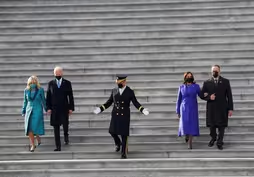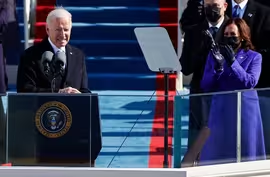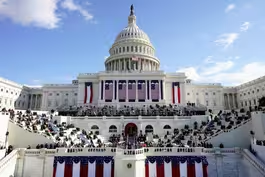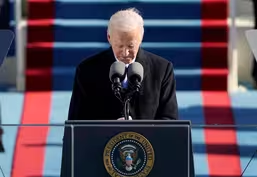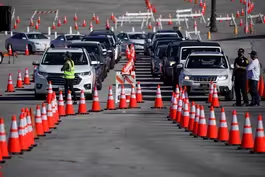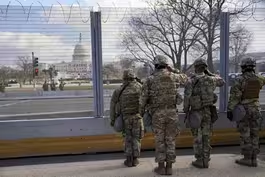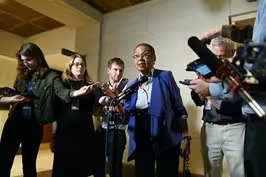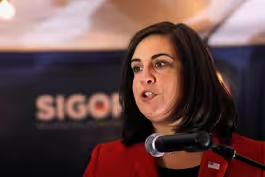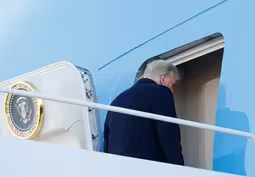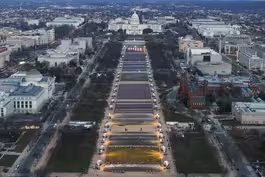
January 20, 2021 - PBS NewsHour full episode
1/20/2021 | 56m 45sVideo has Closed Captions
January 20, 2021 - PBS NewsHour full episode
January 20, 2021 - PBS NewsHour full episode
Problems playing video? | Closed Captioning Feedback
Problems playing video? | Closed Captioning Feedback
Major corporate funding for the PBS News Hour is provided by BDO, BNSF, Consumer Cellular, American Cruise Lines, and Raymond James. Funding for the PBS NewsHour Weekend is provided by...

January 20, 2021 - PBS NewsHour full episode
1/20/2021 | 56m 45sVideo has Closed Captions
January 20, 2021 - PBS NewsHour full episode
Problems playing video? | Closed Captioning Feedback
How to Watch PBS News Hour
PBS News Hour is available to stream on pbs.org and the free PBS App, available on iPhone, Apple TV, Android TV, Android smartphones, Amazon Fire TV, Amazon Fire Tablet, Roku, Samsung Smart TV, and Vizio.
Providing Support for PBS.org
Learn Moreabout PBS online sponsorshipJUDY WOODRUFF: Good evening.
I'm Judy Woodruff.
On the "NewsHour" tonight: JOE BIDEN, President of the United States: This is our historic moment of crisis and challenge, and unity is the path forward.
And we must meet this moment as the United States of America.
JUDY WOODRUFF: A new administration.
Joe Biden calls for unity, as he and Kamala Harris are sworn in and start a new chapter in American history, after four tumultuous years.
Then: the Biden agenda.
The new president confronts the many challenges facing the country with a list of initiatives and executive orders on day one.
Plus: securing democracy.
The transition of power is ensured with a massive show of force in Washington and across the country.
And the art of inauguration.
Public installations stand in for crowds at a ceremony subdued by COVID-19 and security concerns.
All that and more on tonight's "PBS NewsHour."
(BREAK) JUDY WOODRUFF: This day has seen the inauguration of Joseph Robinette Biden Jr. as the 46th president of the United States.
He was sworn in today to lead the nation into the post-Trump era, facing the worst public health crisis in a century and deep political divisions.
And Vice President Kamala Harris, the first woman, first Black, and first Asian to serve in that role, was sworn in on this historic day.
John Yang begins our coverage.
JOHN YANG: Today's was an inauguration unlike any other before.
Missing were the usual crowds, banished due to concerns about security and the pandemic, and replaced on the National Mall by 200,000 flags.
Taking the oath as vice president... KAMALA HARRIS, Vice President of the United States: I, Kamala Devi Harris, do solemnly swear... JOHN YANG: ... the first woman and first woman of color.
And the oldest person ever elected to the nation's highest office took the presidential oath.
JOE BIDEN, President of the United States: I, Joseph Robinette Biden Jr., do solemnly swear... JOHN YANG: Mr. Biden used the family Bible on which he had twice taken the vice presidential oath and seven times as senator.
JOHN ROBERTS, Chief Justice of the U.S. Supreme Court: So help you God?
JOE BIDEN: So help me God.
JOHN ROBERTS: Congratulations, Mr. President.
(CHEERING AND APPLAUSE) JOHN YANG: Standing in front of the U.S. Capitol still scarred by this month's deadly assault by a pro-Trump mob, the 46th president called for unity.
JOE BIDEN: We've learned again that democracy is precious.
Democracy is fragile.
And at this hour, my friends, democracy has prevailed.
(CHEERING AND APPLAUSE) JOE BIDEN: Today, on this January day, my whole soul is in this, bringing America together, uniting our people, uniting our nation.
And I ask every American to join me in this cause.
(CHEERING AND APPLAUSE) JOHN YANG: He acknowledged that the task will not be easy.
JOE BIDEN: We have much to do in this winter of peril and significant possibilities.
Much to repair.
Much to restore.
Much to heal.
Much to build.
And much to gain.
Few people in our nation's history have been more challenged or found a time more challenging or difficult than the time we're in now.
JOHN YANG: And he called for the nation's political discourse to change.
JOE BIDEN: Politics doesn't have to be a raging fire, destroying everything in its path.
Every disagreement doesn't have to be a cause for total war, and we must reject the culture in which facts themselves are manipulated, and even manufactured.
JOHN YANG: Looking on, predecessors Bill Clinton, George W. Bush and Barack Obama, with whom he served as vice president, and Mr. Biden's successor in that office, Mike Pence.
The day's theme of America united was carried on by Amanda Gorman, at 22, the youngest inaugural poet in U.S. history.
AMANDA GORMAN, First National Youth Poet Laureate: We are striving to forge a union with purpose, to compose a country committed to all cultures, colors, characters and conditions of man.
And so we lift our gazes not to what stands between us, but what stands before us.
MAN: On this day, where we emphasize national unity... JOHN YANG: The new president's entire day underscored that idea, from morning mass at St. Matthew's Cathedral with congressional leaders from both parties, to a military pass in review on the Capitol's East Front, and a wreath-laying ceremony with former Presidents Clinton, Bush and Obama at Arlington National Cemetery's Tomb of the Unknown Soldier.
President Biden traveled through a city on high alert.
More than 25,000 National Guard troops patrolled a downtown largely off-limits to visitors and traffic.
Coast Guard vessels kept watch on the Potomac River.
Entering the White House for the first time as president, Mr. Biden quickly got down to business, signing 17 executive orders on issues ranging from the pandemic to climate change and sending Congress his sweeping immigration bill.
DONALD TRUMP, Former President of the United States: A great honor, the honor of a lifetime.
JUDY WOODRUFF: In his final hours as president, Donald Trump was busy too, issuing scores of commutations and pardons to allies.
QUESTION: Do you have any regrets about your presidency?
JOHN YANG: Mr. Trump left Washington this morning, the first time in more than 150 years an outgoing president skipped his successor's inaugural.
He never spoke with his successor or even uttered his name in public.
Mr. Trump did follow one tradition, leaving a handwritten Oval Office note for his successor.
Addressing supporters at Andrews Air Force Base, Mr. Trump pledged to be back in some form.
DONALD TRUMP: I will always fight for you.
I will be watching.
I will be listening.
And I will tell you that the future of this country has never been better.
I wish the new administration great luck and great success.
JOHN YANG: President Trump arrived at his Mar-a-Lago resort in South Florida before his successor was sworn in.
In Washington, President Biden settled in at the White House, where the challenges of the pandemic, the wounded economy, a polarized nation, and crises yet to come lie ahead.
For the "PBS NewsHour," I'm John Yang.
JUDY WOODRUFF: And we turn now to our Yamiche Alcindor, who has been at the White House all this day.
So, Yamiche, for all the pomp and circumstance of this day, the new president has gotten right down to business.
YAMICHE ALCINDOR: That is right, Judy.
After 48 years of government service, Joe Biden is now the 46th president of the United States.
And he said he wasn't wasting any time.
He signed 17 executive orders, 17 executive actions.
They're focused on a number of things that will, I'm told, be the core of his presidency and how he governs.
They include him rejoining the Paris climate accord, as well as instituting a national mask mandate on federal property.
He also is going to be directing agencies to do an equity review, looking at all of their different policies to look at any sort of systemic racism that might be plaguing their agencies.
He also directed some of his energy today to immigration reform, saying that DACA recipients - - those are people that were brought to this country as undocumented immigrants as minors - - that they should be protected.
He's also going to be joining, rejoining the World Health Organization.
This is Joe Biden saying that he wants to get to business soon.
Also, as he was signing in the Oval Office today, he spoke about a letter that President Trump, now former President Trump, left him.
Here's what he had to say.
JOE BIDEN: The president wrote a very generous letter.
I have this.
Because it was private, I will not talk about it until I talk to him.
But -- and it was generous.
YAMICHE ALCINDOR: Now, that, of course, is very interesting, given the fact that President Trump, he encouraged his supporters to storm the Capitol just two Wednesdays ago because he believed that Joe Biden was not the rightful winner of this election.
But it sounds as though President Trump, in his final moments, even though he skipped inauguration, the first president to do so since 1869, that he did leave something nice to say about Biden that, as of now, is between the two men.
JUDY WOODRUFF: Yes, Yamiche, it raises questions that we all want answers to about exactly what was in that letter.
But I guess we will wait until President Biden shares that with us.
But, Yamiche, so much of these orders that he is signing are aimed at undoing the Trump legacy, aren't they, including stopping the building of the wall on the border.
YAMICHE ALCINDOR: That's right, Judy.
He is also going to be revoking the Muslim ban that was a central part of President Trump's presidency.
He's also going to be rolling back the president's COVID-19 plans, making an entirely new COVID-19 plan, asking the surgeon general to resign and putting in his own group.
This goes -- if we can Zoom out a little bit, this goes to what President Biden spoke of in his inaugural address.
He said that this was a country that was struggling and that we needed to be better than this, talking about the fact that there is real issues here when it comes to truth and lies, saying that, before God and before the people who witnessed him today take his oath, that he was going to level with the American people.
He didn't say President Trump's name, but you can insinuate, you can see that he was talking about really turning the page on the Trump era.
Another thing to note is that he is going to be building what he says is the most diverse Cabinet in history.
That, again, is another rebuke for President Trump, who was at times called racist, at times saying that he was - - people saying that he filled his government, not with a government that looked like the American people.
And, of course, if we zoom out even more, there is Vice President now Kamala Harris, the first Black woman, the first South Asian, the first member of Alpha Kappa Alpha Sorority, Incorporated, the first African American sorority, to be vice president.
She is poetic justice in some ways to critics of President Trump, because President Trump began his political career questioning the birthplace of the first African American president.
So, all of this is really a rebuke on President Trump.
JUDY WOODRUFF: At the same time, this new president is saying he wants to unite the country.
So, we will be figuring it out and trying to understand it.
And I know you will be asking a lot of questions starting tonight with the first news conference.
Yamiche Alcindor at the White House, thank you.
YAMICHE ALCINDOR: Thank you.
JUDY WOODRUFF: And now Lisa Desjardins joins us to discuss how the Senate, with its new Democratic majority, will take up the Biden agenda.
Lisa, you have been at the Capitol all day long.
And it wasn't quiet even after the inauguration, because we saw the new vice president swearing in three new Democratic senators.
LISA DESJARDINS: That's right.
Judy, it's a working night here in the U.S. Capitol.
Actually, you can see behind me one of the leaders of the Republican Senate -- or the Republican leader in the Senate, John Barrasso, with some National Guard troops.
But, Judy, in just the last hour or so -- the presidency changed hands this morning.
This evening, the Senate changed hands.
The Senate is now Democratic-controlled, but barely, 50/50.
Why?
Because we saw the swearing-in of three new senators again this evening.
Those are the two new senators from Georgia, as well as a new senator from California to replace Kamala Harris, now Vice President Harris.
And they know that a lot of business needs to get done right away.
As Yamiche was reporting, President Biden is eager to get his Cabinet filled.
First priority here at the Capitol seems to be national security positions.
I am told that we expect a vote on one Cabinet nominee this hour.
That is -- I'm sorry -- one top national security figure.
That's Avril Haines for the position of director of national intelligence.
There was a block on her nomination by Tom Cotton of Arkansas.
He has removed that block, I am told.
And we expect that nomination to be confirmed this hour.
JUDY WOODRUFF: Very interesting.
Watching that so closely.
And, Lisa, it's interesting.
You're saying the Biden people want so much done quickly.
And yet they are looking at an impeachment trial in the Senate, which apparently is going to go forward.
That's going to gobble up time and attention, isn't it?
LISA DESJARDINS: It will.
And before we even get to talk about a trial, the Senate has to sort out how it will conduct its own business.
Right now, there is no real agreement as to how and when any kind of -- any kind of legislation will come to the floor.
Because it is a 50/50 Senate, the leaders, the Republican leader now, Mitch McConnell, and the new Senate majority leader, Chuck Schumer, have to work out a deal for how they can bring legislation to the floor.
They haven't figured that out yet.
They haven't figured out the exact composition of committees even.
So, while Democrats are beginning to operate the Senate, there still is not a process in place to legislate.
And, because of that, there's not really a clear path forward for how to get the impeachment trial off the ground.
It could start at any time, because, technically, House Speaker Nancy Pelosi just has to transmit the article of impeachment.
But we all know that everyone is waiting for the Senate to figure out how it will conduct business.
(CHEERING) LISA DESJARDINS: Maybe you hear some National Guardsmen behind me celebrating, I think, the end of a successful day, they feel.
JUDY WOODRUFF: A long day.
LISA DESJARDINS: Yes.
JUDY WOODRUFF: Well, we will be watching, and I know you will, to see how Chuck Schumer and Mitch McConnell work out the next... LISA DESJARDINS: Yes.
JUDY WOODRUFF: ... very next steps.
We like the beret.
(LAUGHTER) JUDY WOODRUFF: Lisa Desjardins, thank you.
(CROSSTALK) JUDY WOODRUFF: Thank you very much.
And now to Amna Nawaz, who has been on the National Mall all this day from early morning into tonight.
So, Amna, you started out this day looking at the security picture there on the Mall, at a place that -- where, normally, there would be crowds.
But, as you reported early in the day, that's not what happened.
AMNA NAWAZ: Not at all, Judy.
That's right.
You and I both know, anyone who's covered inaugurations in the past knows this Mall is typically chock-a-block full of hundreds of thousands of people who gather here specifically because of the view you get of that West Front at the Capitol steps there to watch the swearing-in.
That swearing-in is usually met with thunderous applause and cheers.
Today, it was met with a deafening silence, because, of course, the Mall, like much of Washington, D.C., is closed down, shuttered, among health and security concerns and the pandemic and security concerns, after that Capitol attack just two weeks ago.
We're inside what is known as the Red Zone.
It's a robust and heavily fortified security perimeter that was set up a few days ago.
It's maintained by miles and miles of metal fencing, by several layers of security barriers, and also, as John Yang reported earlier, the presence of 25,000 National Guard troops who have descended from every corner of the country to help secure the inaugural ceremonies.
Today, one group from Texas told us, in fact, they have been working very long hours, sleeping only a few hours every night.
And, for many of them, it was their first trip to Washington, D.C., ever, so quite a first trip for them.
But they were here, of course, to try to prevent some of the same forces that we saw storm the Capitol steps two weeks ago from acting again, those white supremacist and conspiracy and anti-government forces who did violently storm the Capitol.
Sources tell us, intelligence and national security sources tell us the online chatter suggests that many of those groups decided against taking any kind of action today, largely because of the security presence, and many of them felt it wasn't worth the risk.
But those sources say those same groups are holding their fire potentially for another day.
That threat has not gone away.
Judy, one other thing I will mention.
Sources tell us they were watching today online followers of this QAnon conspiracy theory, a pro-Trump group that we have been reporting on several times over.
Many people of this group told us even on days I spoke to them outside the Capitol attack that they believed President Trump had some kind of secret plan, some kind of big action he was going to take today, on his final day in office, that would allow him to stay in power.
That, of course, did not happen.
And, online, many of them are expressing anger and disbelief.
More worryingly, some of them are spinning new conspiracy theories about why that didn't happen and what could happen next.
Judy, this is evidence of the dangerous disinformation campaigns that we saw emanating from the White House over the last four years.
And these are just some of the challenges that the Biden administration will inherit as they're coming into office.
But at least today, security officials say they are grateful the transfer of power was peaceful -- Judy.
JUDY WOODRUFF: Listening to you, Amna, and just shaking our head at what you're saying.
But, very quickly, I hear you saying, even though the threat was minimal today, we didn't see its presence, authorities are very much on guard in the days and weeks to come?
AMNA NAWAZ: Absolutely, Judy.
They stressed to us those threats, the same forces that stormed the Capitol two weeks ago, they are robust, they persist, and they will be planning future attacks as well.
Just because they didn't act today does not mean they won't act in the future.
This will be an enormous problem we heard President Biden address in his inaugural address as well, that these are some of the forces they will have to contend with in the years ahead -- Judy.
JUDY WOODRUFF: Amna Nawaz, it's enough to keep us all on edge.
Thank you very much.
Meantime, Nick Schifrin has been reporting on the enormous security operation in the capital, across this city, and across the country.
And he joins us now from the streets of Washington.
So, Nick, tell us what you're following today.
NICK SCHIFRIN: Yes, Judy, we have talked so much about those 25,000 National Guard troops and the closures, not only where Amna is, about a mile from me or so on the Mall, but the bridges coming in and out of D.C. and the streets.
You can see behind me still National Guard and still a checkpoint.
They are still checking I.D.s at this late hour.
And that also meant that almost no protesters were able or allowed to get into D.C. today.
In fact, the Park Police only approved a single park permit for a single protest group, and that was supposed to take place in something called a free speech zone.
I believe we have got some video of that free speech zone.
It's basically a pen that was in downtown D.C. And when we went, it was absolutely empty.
Protesters clearly just couldn't get there or didn't want to get there.
When I talked to military officials, they reiterate what Amna just said, that the unprecedented show of force by the military, the unprecedented closures was a deterrence factor, keeping away those protesters that they did believe could have come not only today, but over the weekend, and launched armed protests.
At least, that's what they were worried about.
Now, there were some questions by some lawyers about the extent of the free speech restrictions.
But, bottom line, the military officials I talk to and the national security officials and the transition officials say that today was about guaranteeing that peaceful transfer of power.
And it works not only here, but also across the country.
We have collected some video and photos from all 50 state capitols.
And, basically, what we saw across the country, whether Madison, Wisconsin, Harrisburg, Pennsylvania, Lansing, Michigan, Olympia, Washington, Saint Paul, Atlanta, was not only very few protesters, but a large show of force outside those capitols, following really a national campaign by the FBI to try and arrest all those insurrectionists from January 6.
Finally, Judy, the military reiterated again and again leading up to today that there would be no stop in continuity, there would be no loss of the chain of command.
But a few hours ago, the Biden transition team had to send out an e-mail about the acting secretaries.
Biden starts his presidency without any national security officials already in place.
And it occurred to me that what Senator Blunt said, the Republican chairman of the Inaugural Committee, holds true.
He said that, look, in this time of transition, when it comes to national security, in some ways, America is at its most vulnerable, but, also, America is at its most powerful, proving the perseverance of democracy on a day like today.
JUDY WOODRUFF: No question.
And that echoes what we did hear from President Biden in his inaugural remarks, that democracy endures, perseveres.
Thank you very much, Nick Schifrin, for your work all this day.
Thank you.
For more on this history-making day, I'm here in our studio with James Fallows, who's been watching at my side here as the inauguration events have unfolded.
He is a journalist.
He's a longtime writer for "The Atlantic" and former speechwriter for President Jimmy Carter.
Jim Fallows, thank you, and thank you for being here all day as we watched everything happen.
As you think back on this speech, a lot of different remarks, and we use some excerpts of it earlier, what is ringing true to you?
JAMES FALLOWS, "The Atlantic": So, what strikes me, we were talking earlier today about how every inaugural speech -- excuse me -- is essentially two stories, the story of who we are, we, the country, and the story of who I am, I, as the person who's taking over responsibility.
I think that the new President Biden answered both those stories clearly.
The story of who we are is a country with very severe problems right now.
And he sounded quite realistic about the pandemic, economic polarization and collapse, political friction, and the realm of untruths, but, also, just to continue, that we're a country with problems, but that can be better, that can get better.
So that's the story of the country.
The story of himself is somebody who is plainspoken - - it was not a highfalutin speech.
JUDY WOODRUFF: Right.
JAMES FALLOWS: Empathetic, knows that fate can deal you an unfair hand, and wants to compromise.
I think the line that stuck with me is, "My whole soul is in this," the exercise of pulling us together.
So, that stays with me.
JUDY WOODRUFF: We come back to the theme of unity, how it's almost desperate, Joe Biden is almost desperate to bring the country together.
He kept coming back to that again and again in these remarks and in remarks he's made in the days and weeks and months of his campaign and after the election.
JAMES FALLOWS: I think something that is effective about his rhetoric -- again, it's not going to be inscribed in the oratory books.
But he has been the same person over the past 40-plus years and the past six months, from the Democratic Convention through the election, essentially saying: I want to represent everybody.
I recognize this is a diverse country.
I will do my best to convince you.
If you disagree, OK, but we are better off if we're all together.
And I think that was a theme that went through even the symbolism of having the former presidents from different parties going to Arlington, the wonderful poem from Amanda Gorman talking about the process of becoming for this country.
So, I think we had from President Biden a notably faith-inspired speech.
It was clear that he was a man who takes his religion seriously, and thought that his duty of his secular faith now was to help bring a divided country together.
JUDY WOODRUFF: It's -- you started out by saying this is not a person, in so many words, of soaring rhetoric, soaring oratory.
But it felt real.
I mean, it felt like this is who Joe Biden is, as you said.
JAMES FALLOWS: Yes, both those things are true.
There's a kind of rhetoric that would be authentic to Barack Obama, or to Bernie Sanders, or to Elizabeth Warren.
And if Joe Biden read those words, that would sound inauthentic to him.
I felt as if we were hearing somebody in his own voice, his own sensibility, his own word choice, his own emphases.
And so it seemed like a real person we were seeing.
JUDY WOODRUFF: Jim Fallows, you have looked at a lot of presidents and what they have said in their inaugural addresses.
How much have those addresses sent a signal that told us, told the country something about the way they would govern?
JAMES FALLOWS: We can look back four years, when Donald Trump had his American carnage inaugural, which was, unfortunately, a signal.
I think, for most inaugural addresses, they do give a new president some kind of margin of error, some honeymoon from a public, saying, we recognize what you're trying to do.
You're telling us who we are, who you are.
We're going to look for the best.
And I think that Joe Biden did that, at least for today.
JUDY WOODRUFF: Jim Fallows, who has watched a lot of inaugural speeches, has written some himself.
JAMES FALLOWS: Yes.
JUDY WOODRUFF: Thank you very much.
JAMES FALLOWS: Thank you, Judy.
JUDY WOODRUFF: Appreciate it.
Meantime, an important glass ceiling was broken today when Kamala Harris became the country's first female vice president.
Delegate Eleanor Holmes Norton is a longtime civil rights activist.
She represents the District of Columbia in the Congress.
And she joins us now.
Eleanor Holmes Norton, welcome back to the "NewsHour."
Thank you so much for being here.
Tell us what you took away from today.
DEL.
ELEANOR HOLMES NORTON (D), Washington, D.C.: From today, Judy, you saw the effect of arrests after January 6's insurrection and tightened security that followed it.
Sitting where I was, as a member of Congress, you couldn't see that.
But if you represent the District, as I do, you saw it every day.
I live on Capitol Hill.
The mayor had to get a police escort to get me through to the Capitol.
That's just how tight it was.
I certainly hope this will relax.
And, Judy, I think it will, because I think the security has had a deterrent effect.
We all -- around the country and the states, we saw very little in the way of demonstrations.
They were very puny.
We think that -- I think that, had we had the kind of force at the Capitol when Trump inspired an insurrection, that we would not even have seen that near as bad as it was.
And I certainly think that the deterrent effect was felt throughout the country today.
JUDY WOODRUFF: No doubt that would have made a difference on January the 6th.
But it was, as you say, under very different circumstances.
Delegate Eleanor Holmes Norton, what about - - well, let me ask you this.
What gives you confidence that, because today was quiet, that that will continue to be that way?
DEL.
ELEANOR HOLMES NORTON: Well, one thing that gives me confidence is that Trump is no longer in power.
So, you're not going to see people -- particularly when you see what kind of a job the FBI is doing.
The FBI is rounding up hundreds of people.
And now, on social media, they're able to do it.
They're rounding them up, they are arresting them, and they are charging them.
So, people have to decide, is this really worth it?
And I think we're seeing the beginnings of -- we saw the beginnings of that today, with the puny demonstrations even in the states.
And when I think the effect of the FBI arrests is having -- is having its own effect on individuals.
So, I really -- I'm not among those who say, just wait for the -- just wait.
And I saw some of that in your earlier news report, that it could get much worse.
Well, I will give you an example.
There were to be demonstrations here on Monday.
Why didn't they occur?
JUDY WOODRUFF: Mm-hmm.
DEL.
ELEANOR HOLMES NORTON: I believe that there had already begun to have had an effect, the tightened security that we are now finally seeing here in the Capitol.
JUDY WOODRUFF: Well, I know everyone would certainly like to think that times are going to stay safe for as long as we can imagine into the future.
But I also want to ask you about the historic firsts today, Delegate Eleanor Holmes Norton, and that is Kamala Harris not only being the first woman, but the first Black, the first Asian to become vice president.
You have been involved.
You go back to the 1960s.
You have been very active in thinking about these things.
What does -- what did that mean to you today?
DEL.
ELEANOR HOLMES NORTON: Well, I think we have seen perhaps, I think, as many as six vice presidents become president.
This president is the oldest president ever.
He could decide not to go for another term.
But I think she is really in line to become president of the United States.
And what a first that would mean, the first woman and the first Black.
JUDY WOODRUFF: The first -- after President Obama, the first Black woman.
DEL.
ELEANOR HOLMES NORTON: Black woman, first Black woman, yes.
JUDY WOODRUFF: How much -- let me ask you about the -- what Joe Biden is trying to do.
He has a fairly ambitious agenda in terms of what he wants to see spent to fight -- to help people in this pandemic economy.
Do you see, among Republicans you talked to, a willingness to work with him on this?
DEL.
ELEANOR HOLMES NORTON: Well, he has one advantage, and that is that he has worked with Republicans his entire life.
The man's been in public life and in the Congress for more than 30 years.
So, he starts out with an advantage that no Democratic president has had.
I think that there will be some chastened Republicans.
I was pleased to see so many show up and speak at the inauguration.
And I think that it's also important to also recognize this is a moderate Democrat.
That means, it seems to me, particularly with his experience in the Senate itself, that he is in a position to find rapport across the aisle.
JUDY WOODRUFF: What do you think -- just in the very little bit of time, few seconds, we have left, what do you think he should be focusing on first?
And do you favor the impeachment trial taking up days to come early in his term?
DEL.
ELEANOR HOLMES NORTON: I don't favor the impeachment trial.
I think the first 100 days must be focused on what should be the focus of this presidency.
Now, I'm not going to say D.C. statehood, but I'm pleased that he is for D.C. statehood, and that we have the House, the Senate, and the presidency, which puts us in good stead to get it.
But his agenda is laid out for him, Judy.
He's got to focus on the virus.
He's got to then look at the economy.
That's written for him.
And I think he's been plainspoken that that's what he's going to do.
JUDY WOODRUFF: Delegate Eleanor Holmes Norton, representing the District of Columbia, thank you so much.
Very good to have you with us.
DEL.
ELEANOR HOLMES NORTON: My pleasure.
JUDY WOODRUFF: And now for how Republicans in Congress are viewing the new president and his agenda.
For that, I'm joined by Representative Nicole Malliotakis of New York.
She just began her first term in the House, and yesterday was named an assistant Republican whip.
Representative Malliotakis, thank you so much for joining us.
You're joining us from your home city, Staten Island, New York.
What did you -- I assume you did watch and listen to the inaugural ceremony today.
Tell us what you thought of what you saw and what you heard.
REP. NICOLE MALLIOTAKIS (R-NY): Yes, unfortunately, I couldn't make it back in time to Washington to complete the required health screening to attend in person.
But I did watch from my home.
And, look, I was very open-minded.
I'm going into this with an open mind.
I want to work with everyone and anyone who will put America first and help us overcome this pandemic, get our economy back on track, and restore the American jobs that we lost over the last several months.
I certainly believe that, when Joe Biden says he wants to bring this country together, that he means it.
The issue becomes that there is a lot of division.
And the division, I believe, is caused because there's just different paths that individuals want to take this country.
And I think that we have to find a way to find that common ground and work together.
I'm certainly willing to do that where we can find that common ground.
But I'm also mindful that I represent the district of Staten Island, Southern Brooklyn.
I'm always going to do what's in the best interest of my constituents.
And if I see this administration doing something that harms them or our nation, I'm going to push back.
JUDY WOODRUFF: We heard President Biden today say, in so many words, it's possible to disagree with each other without getting into essentially a political war.
Do you think it's possible to disagree in a more civil way than what we have seen in the recent years?
REP. NICOLE MALLIOTAKIS: I really hope so And I think it's incumbent upon all of us to try to bring the temperature down a bit and try to debate individuals on issues.
You know, we shouldn't be -- the political discourse we have seen over the last several years by members of Congress, by individuals in the political arena has been damaging.
And I think social media has a lot to do with it, quite frankly, because everyone feels that they can just go on social media, on Twitter or on Facebook, and give every thought that's in their head.
I think we have got to go back to the basics of governing, which means that we need to debate on the House floor on the merits of the issues, and not attack individuals personally.
I think where Joe Biden has an opportunity to work with the Republican members of Congress is by looking for ways to find that center, that middle ground that puts America first, not to allow the socialist Squad, individuals like Alexandria Ocasio-Cortez, who have an extreme agenda for our nation, who fundamentally want to change our nation towards socialism, to take control.
And with the margin being so close between majority and minority in the House of Representatives, he does have that opportunity to work with Republicans and when -- to forward an agenda when it comes to infrastructure and transportation and making those necessary improvements, to getting our economy back on track, to bringing a lot of our production home from places like China, and making sure that we are actually working diligently to distribute this vaccine as quickly as possible and push states like ours and New York to reopen its economy and get people back to work.
JUDY WOODRUFF: I'm sure you know that Representative Ocasio-Cortez would not -- would say they do not consider themselves socialists.
But we can debate that another time.
REP. NICOLE MALLIOTAKIS: Well, they self-proclaim socialists, though.
They have self-proclaimed and said they're socialists.
JUDY WOODRUFF: I do want to ask you about - - you did vote to object to the electoral vote counts from the states of Arizona and Pennsylvania in the House.
Do you consider Joe Biden legitimately elected as president?
REP. NICOLE MALLIOTAKIS: Joe Biden had more electoral votes than just Arizona and Pennsylvania.
And with the certification that took place that day, and with the swearing-in today, he is the legitimate president, and we must do the best to find common grounds to work together.
I do believe, though, that there are certain irregularities that existed in our election system.
We need to make sure that we solidify the integrity of this system.
As you know, since the last couple weeks alone, there have been arrests in Texas and Louisiana for election fraud.
And there are millions, tens of millions of Americans who are concerned about the integrity of the system.
And so I'm a proud co-sponsor of a new bill, the Save Democracy Act, that will look to further solidify the integrity of our system, make sure that we do have voter I.D.
laws, making sure that we don't allow for automatic voter registration with a foreign document, as is going to happen in the state of New York unless the person opts out when applying for a driver's license, and making sure that we prohibit certain harvesting tactics.
And other safeguards that we're supporting are in that measure as well.
But I think that, look, we only wanted to shed light.
In my view, my vote was to shed light to some of the irregularities, some of the questions that were never actually heard in court due to time constraints.
And I think that the American people just owe that -- they -- we owe it to them to prove that our election system is safeguarded and any of these concerns are addressed.
JUDY WOODRUFF: Well, I don't -- my reading of it is that people don't object to further investigation, but that, so far, there's been no evidence of any significant amount of fraud.
But, finally, I do want to ask you about President Biden's proposal, additional $1,400 in pandemic relief, direct payments to people, other measures to try to give an immediate boost to the economy.
Are you in favor of that?
REP. NICOLE MALLIOTAKIS: Well, I will certainly look at the bill that he presents.
I'm mindful that we're moving forward a $30 trillion debt in this country, and so we have to make sure that any legislation is tailored specifically to the people who are unemployed due to this crisis, and also to businesses that have been mandated to be closed because of governors like Governor Cuomo.
So, I think that's something that we need to work together on.
And I will certainly be reviewing legislation that comes before me to make sure that it best meets the needs of those I represent.
JUDY WOODRUFF: Representative Nicole Malliotakis, newly elected from the state of New York, congratulations on your election, and thank you so much for joining us.
REP. NICOLE MALLIOTAKIS: Thank you.
JUDY WOODRUFF: Former President Donald Trump's final hours in office, as it turned out, included one last sweep of pardons and commutations involving 144 people in all.
Stephanie Sy has a closer look.
STEPHANIE SY: Judy, the list of 74 pardons and 70 commutations included many individuals championed by celebrities and criminal justice advocates, but also notable Trump political allies.
He pardoned his former White House aide Steve Bannon, who faced fraud charges, a big campaign fund-raiser, Elliott Broidy, who had admitted to breaking foreign lobbying laws.
He commuted the sentence of longtime Democrat and former Detroit Mayor Kwame Kilpatrick, convicted on racketeering and other counts.
And he pardoned famous rapper Lil Wayne, who is facing a weapons charge.
To talk about who was and was not on the list, I'm joined by Dan Kobil, law professor at Capital University in Ohio.
Professor, thank you so much for being with us.
I want to hone in on the political allies that former President Trump now pardoned or commuted the sentences for, particularly Steve Bannon.
Bannon has not even been put on trial for fraud charges yet.
How unusual is that, and why is that significant?
DAN KOBIL, Capital University; Dan Kobil, Capital University: That is highly unusual, Stephanie, because the courts have not even decided whether he's guilty.
So, typically, acceptance of a pardon is an admission that one is guilty of the offense with which they're charged.
So, Bannon has never gone through the justice system, and the other branches of government have not had an opportunity to weigh in on his misdeeds.
Or perhaps he's innocent.
So, in many ways, the short-circuiting of the system is highly unusual.
STEPHANIE SY: Short-circuiting is one word.
We also know that President Trump did not go through the traditional Department of Justice vetting process for many of these cases on the commutation and pardons list.
What other precedents were set during the Trump presidency that should be concerning, especially to a constitutional law professor like yourself?
DAN KOBIL: Many people are highly troubled by the president's pardoning approach, because it really was the worst of both worlds.
By not going through the Justice Department's process, the president ignored thousands of ordinary people who had applied for pardons or commutations, typically pardons, in order to cleanse their records, in order to obtain employment opportunities, or things like that.
Indeed, Trump closed without any action by far the most pardon and commutation requests in history.
So, he was inactive for the vast majority of requests, yet he was active for those with whom he was connected or had some sort of sympathy.
So, it really was the worst of both worlds, in that it avoided the regular pardon process that we need to make justice humane, which is what the founders of the Constitution wanted, yet it shows, in the ones that were granted, that there are really two tiers of justice, one for those who are connected to the president, and one for everybody else.
STEPHANIE SY: What does the sheer number and nature of the pardons granted by former President Trump say about his presidency and his legacy, Professor?
DAN KOBIL: The numbers are not that unusual for a Republican president.
Indeed, President George H.W., Herbert Walker, Bush only granted about 77 pardons and commutations.
By the time Trump is done, he will have between 200 and 300.
So, I would have to tally up the exact number.
The pardon attorney's office has not published those yet, but his numbers are not as out of whack with modern presidents.
But it's who he pardoned that is highly unusual.
STEPHANIE SY: Dan Kobil, law professor at Capital University in Ohio, we certainly appreciate your perspective, especially on this momentous day.
DAN KOBIL: Great.
Thank you for having me, Stephanie.
JUDY WOODRUFF: In the day's other news: As President Biden took office, the U.S. death toll from COVID-19 kept climbing past 405,000.
At the same time, a number of states reported they are running out of vaccine supplies.
The CDC estimated nearly 36 million doses have gone out to the states, but, so far, only two million people have received the full course of two doses.
Overseas, world governments largely welcomed President Biden's inauguration.
In Brussels, the president of the European Commission voiced hope for much better relations with the U.S. in the post-Trump era.
URSULA VON DER LEYEN, President, European Commission: This new dawn in America is the moment we have been waiting for so long.
Europe is ready for a new start with our oldest and most trusted partner.
JUDY WOODRUFF: Meanwhile, Iran's President Hassan Rouhani urged President Biden to rejoin the 2015 nuclear deal that the U.S. withdrew from under President Trump.
China voiced hope today for new cooperation with the U.S. under the Biden administration.
Beijing also imposed sanctions on former Secretary of State Mike Pompeo and other Trump administration officials.
They're accused of violating Chinese sovereignty and disrupting relations.
The sanctions bar them doing business with China and from entering the country.
The government of Israel raced to approve more housing in East Jerusalem and West Bank settlements just before President Trump left office.
An Israeli watchdog group says that nearly 2,600 new units got the green light.
President Biden is expected to return the U.S. to a policy of strongly opposing settlement expansion.
And back in this country, Wall Street had its best Inauguration Day in 36 years, on hopes for more economic stimulus.
Major indexes finished at new highs.
The Dow Jones industrial average gained 257 points, to close at 31188.
The Nasdaq rose 260 points, 2 percent, and the S&P 500 added nearly 53 points.
Still to come on the "NewsHour": public art stands in for crowds at a ceremony subdued by COVID-19 and security concerns; and students write open letters to the new president expressing their hopes for change in America.
As we have seen, today's inauguration featured unusual imagery, a response to the unusual circumstances.
The temporary public art is intended to represent the American people and to unify the country.
Jeffrey Brown has our look.
It's part of our arts and culture series, Canvas.
JEFFREY BROWN: In the sky above Washington, pillars of light, 56 in all, symbolizing the 50 states, the District of Columbia and five U.S. territories.
On the ground, a field of flags, nearly 200,000 of them, representing the millions of people unable to attend due to pandemic and ramped-up security measures, an inauguration without precedent, imagery to match.
ADAM BARON, Presidential Inaugural Committee: This is something that is meant to be evocative for everybody.
JEFFREY BROWN: Adam Baron, deputy director of events for the Presidential Inaugural Committee, helped create and oversee the installations, American flags of all sizes, flags of the states and territories.
Baron says the idea grew from looking at past inauguration scenes.
ADAM BARON: When you look down the Mall, it's not just the people that you see.
There are just these thousands of waving American flags that represent people from all stripes coming together to celebrate a new administration.
So, we sort of took that image, and we wanted to have those waving flags represent people that could not safely or smartly come together and gather this year.
JEFFREY BROWN: So, the imagery is really from inaugurations past, but without the people, in a sense.
ADAM BARON: Yes.
We knew we had to do something that was still celebratory to commemorate the importance of the moment, but that was smart and thoughtful of the health and safety of everybody involved.
JEFFREY BROWN: Of course, the intended audience was, as with so much now remote, public art on public space now closed to the public, and not just any space, but the National Mall, home to enduring symbols of American democratic values.
Philip Kennicott is a Pulitzer Prize-winning critic for The Washington Post.
PHILIP KENNICOTT, The Washington Post: In Washington, we're just two weeks out from having seen a violent mob storm the Capitol.
What we see here is, in a sense, a kind of fantasy of the crowd, as orderly, as collective, as gathering in proximity, but in a constructive way.
JEFFREY BROWN: Constructive, yet different for this very different moment.
Kennicott points to the evocative shafts of lights that once illuminated the absent World Trade Center Twin Towers after 9/11, or the rows of orderly flags familiar at cemeteries or battlefields.
Those evoke sorrow.
These images, he thinks, might offer something more hopeful.
PHILIP KENNICOTT: By using the National Mall in this way, they're inviting us not just to sort of be spectators, but to kind of project ourselves into that crowd and feel as somehow we're more than just passive participants in this.
JEFFREY BROWN: You're saying we, as citizens, need to find a new way to connect to public spaces, to public events, to politics itself.
What role does the art play?
PHILIP KENNICOTT: In some ways, that's an effort to get us to go beyond the fairly passive and reactive role that we have taken up with democracy through things like social media, through television, and actually get out there and do something, be physically present.
We can't do that at the moment.
But this is making us, in a way, yearn to be in that space a little more tangibly than we might if we just watched it on television, as we used to do.
JEFFREY BROWN: That asks a lot of what is, after all, a temporary art installation.
But we're a country in need of a lot just now.
For the "PBS NewsHour," I'm Jeffrey Brown.
JUDY WOODRUFF: So, ow does this historic inauguration look to young people?
Our Student Reporting Labs reached out to our network of high school journalism programs to find out what they hope the new administration accomplishes.
Here they are in their own words.
CIARA RILEY WILSON, Los Angeles; Dear Mr. President and Madam Vice President.
MICAH MARTIN, Michigan: Dear Mr. President.
NIGEL FENG, California: Dear Mr. President.
KENNEDY CORLEY, Washington, D.C.: I hope you will consider this message.
BROOKE RINGSTAD, Michigan: As someone who's currently COVID-positive and quarantining in their bedroom, what's really important to me is seeing that the pandemic is handled with urgency and care.
CARLOS MCWHORTER, Michigan: My hope for you as a president is that you can create more jobs for the people of the U.S. KEVIN MYERS, Virginia: I think seeing swift and forceful action taken to combat global climate change is going to be something incredibly important.
BRITNEE BLAKE, Florida: V.P.
Kamala Harris, I hope you know that being in your position is a huge inspiration for Black women among this country.
And I hope you know that it shows that, with hard work and dedication, we can accomplish all of our goals.
CLARE JONES, Michigan: I hope to see a progressive plan in combating climate change.
DANIEL PHILLIPS, New York: Continue to bring money back to middle-class families.
Continue to rise the poor out of unemployment and back into jobs in our country.
SHADEN LATHROP, Ohio: Do you plan on addressing this volatile split in America right now, and, if so, how?
Do you think you can repair this break?
ANDREA SALAZAR LOPEZ, Oregon: I put my faith in you to end systemic racism and tear down all the barriers that come with it.
JUDY WOODRUFF: So inspirational.
And you can watch the entire "We the Young People" inauguration special.
That is on our Web site.
And also on the "NewsHour" online right now: Black women representing the oldest African American sorority, Alpha Kappa Alpha, are cheering as Vice President Kamala Harris, a member of their own organization, makes history today.
Find out more about that reaction on our Web site, PBS.org/NewsHour.
And later tonight on PBS, you can watch special coverage of the inaugural evening festivities.
Bruce Springsteen, Lin-Manuel Miranda, and other artists will perform in an event hosted by Tom Hanks.
There will also be remarks from President Biden and Vice President Harris.
That's "Celebrating America," tonight at 8:00 p.m./7:00 Central right here on PBS.
And that's the "NewsHour" on this historic night.
I'm Judy Woodruff.
Join us online and again here tomorrow evening.
For all of us at the "PBS NewsHour," thank you, please stay safe, and we'll see you soon.
Biden calls for unity in a deeply divided nation
Video has Closed Captions
Clip: 1/20/2021 | 4m | Biden calls for unity in a deeply divided nation (4m)
Biden signs executive actions aimed at undoing Trump legacy
Video has Closed Captions
Clip: 1/20/2021 | 7m 17s | Biden signs executive actions aimed at undoing Trump's legacy (7m 17s)
Biden sworn in as the 46th president
Video has Closed Captions
Clip: 1/20/2021 | 5m 44s | Biden sworn in as the 46th president, beginning a new chapter in the post-Trump era (5m 44s)
High school students share hopes for Biden administration
Video has Closed Captions
Clip: 1/20/2021 | 1m 32s | High school students share their hopes for the Biden administration (1m 32s)
News Wrap: U.S. death toll from COVID-19 reaches 403,000
Video has Closed Captions
Clip: 1/20/2021 | 2m 45s | News Wrap: As Biden takes office, U.S. death toll from COVID-19 reaches 403,000 (2m 45s)
Peaceful transfer of power ensues amid massive show of force
Video has Closed Captions
Clip: 1/20/2021 | 7m 3s | Peaceful transfer of power ensues amid massive show of force (7m 3s)
Rep. Eleanor Holmes Norton on breaking the glass ceiling
Video has Closed Captions
Clip: 1/20/2021 | 6m 37s | Rep. Eleanor Holmes Norton on breaking the glass ceiling (6m 37s)
Rep. Malliotakis on how Republicans view Biden's agenda
Video has Closed Captions
Clip: 1/20/2021 | 6m 58s | Rep. Nicole Malliotakis on how Republicans view Biden's agenda (6m 58s)
Trump's final hours: a flurry of pardons and commutations
Video has Closed Captions
Clip: 1/20/2021 | 4m 50s | In Trump's final hours in office, a flurry of pardons and commutations (4m 50s)
Unusual imagery for an inauguration without precedent
Video has Closed Captions
Clip: 1/20/2021 | 3m 58s | Public art installation offers unusual imagery for an inauguration without precedent (3m 58s)
Providing Support for PBS.org
Learn Moreabout PBS online sponsorshipSupport for PBS provided by:
Major corporate funding for the PBS News Hour is provided by BDO, BNSF, Consumer Cellular, American Cruise Lines, and Raymond James. Funding for the PBS NewsHour Weekend is provided by...
